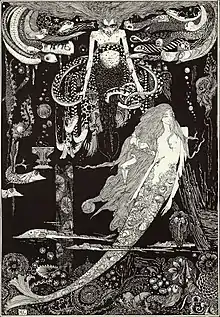Sea witch
Sea witches are traditional folklore characters usually portrayed as women with a magical bond or power regarding the sea, the weather, or other aspects of seafaring life. Sea witches have been featured in European folklore for centuries. They possess a vast array of powerful magic, drawn from the brine of the sea.
Folklore
Traditionally, sea witches were witches who appeared among sailors or others involved in the seafaring trade. A sea witch may be presented as a magical or fairy creature such as a mermaid or selkie, or as an ordinary human who uses magic to influence the sea. Their powers ranged from control over the winds and weather or the ability to influence the catches of fisherman, to complete power over the sea, the tides, and the moon. Offending a sea witch by such means as refusing to pay her for her services, insulting her looks, or refusing to acknowledge her powers could end in disaster, as the sea witch might choose to destroy an entire ship.
In addition to their powers over water, sea witches were said to control the wind and weather. A common feature of many tales was a rope tied into three knots, which witches often sold to sailors to aid them on a voyage. Pulling the first knot could yield a gentle, southeasterly wind while pulling two could generate a strong northerly wind, but the third knot would unleash a hurricane. In some versions of sea witch lore, the witch had the power to call up treasures lost in shipwrecks. In some stories a grieving widow begs the sea witch to bring to shore the body of a drowned husband, child, or sweetheart so that it could be given a proper burial; in some versions, this requires casting a coin or a ring into the sea as the witch's payment.
Spiritual and religious
The term 'sea witch' may be applied to a practitioner of Paganism or Wicca who often uses water when casting spells. In occult usage, the terms 'sea witch' and 'water witch' may be used interchangeably, though the term 'water witch' is also applied specifically to those who dowse for water. In his 1997 book Earth Power, Scott Cunningham refers to water magic(k) as a type of elemental magic(k), given that water is an element found in Pagan and Wiccan practices. Despite their association with water, Cunningham places rain, fog and storm magic(k) under the subheading of natural magic(k) rather than water magic(k).
In popular culture

Along with their inclusion in older stories, sea witches have been included in contemporary stories as well.
- The nymph Calypso is portrayed in The Odyssey with some powers of a sea witch: she is able to lure Odysseus' ship to her island while simultaneously causing the seas to repel all other ships that would rescue him, and she uses her powers to keep the weather around her island beautiful so that Odysseus will be seduced into remaining there.
- The witch Sycorax in Shakespeare's The Tempest is often interpreted to be a sea witch.
- Created in 1929, the Sea Hag is a pirate and the "last witch on Earth" in the Popeye comics and cartoons.
- Ursula, the main antagonist in Disney's The Little Mermaid (1989) is a sea witch who is a half-human, half-octopus creature.[1] The TV series listed her kind as Octopins. The antagonist of the sequel The Little Mermaid II: Return to the Sea, is Ursula's younger sister Morgana, who's also a sea witch.
- In Once Upon a Time, the sea witch version of Ursula (portrayed by Merrien Dungey) is the daughter of King Poseidon and named after the sea goddess of the same name. While originally a mermaid, Ursula later used her father's trident to turn her fishtail into octopus tentacles after King Poseidon orchestrated events that led to her losing her singing ability.
- In the live-action movie Descendants 2 and Descendants 3, Ursula's daughter Uma (portrayed by China Anne McClain) is also a sea witch and can even assume her half-octopus form.
- The character of Tia Dalma in Pirates of the Caribbean: At World's End presents herself as a mortal witch with some power over the sea, but is later revealed to be a sea goddess named Calypso.
- The Feldons 2012 album Goody Hallett and Other Stories is based on the legend of Goody Hallett, a sea witch who in the mid-1700s reputedly sold her soul to the devil and lured sailors to their deaths on the rocks.
- The Sea Witch is a hero unit featured in the video game Warcraft III: The Frozen Throne. The Sea Witches are the foremost of the Naga (night elves mutated into aquatic creatures by the Old Gods). The most prominent of them is Lady Vashj, the handmaiden of the infamous Queen Azshara and an ally of Illidan Stormrage.
- Countess Palatine Ingrid Von Marburg in Salem is a Water Witch, able to travel spectrally in her hag form via bathtubs and wells. Her presence can also be detected by a water charm spell.
- In AdventureQuest Worlds, there is a sea witch named Cecelia who resides in a shipwreck and is the boss of some Merdraconian Squatters. The players and Voltaire encounter her while looking for Voltaire's missing gargoyle bat Gargoyle. They were able to get away from Cecelia.
- In the TV series PJ Masks, a sea witch named Octobella serves as one of the antagonists in the show. She can throw whirlwinds underwater, turn invisible, and make various spells using crystals.
See also
References
- "Ursula the Sea Witch". Archived from the original on 2013-02-04. Retrieved 2008-07-05.